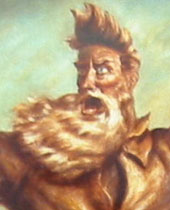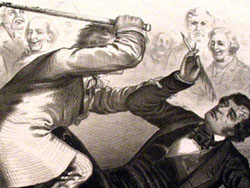Political civility and religious liberty
Exploring the connection between the First Amendment and political civility in America
By Bruce T. Murray
Author, Religious Liberty in America: The First Amendment in Historical and Contemporary Perspective
 Sen. Joseph McCarthy was a symbol of political incivility and the "paranoid style of politics" in the 1950s.
Sen. Joseph McCarthy was a symbol of political incivility and the "paranoid style of politics" in the 1950s. - The false claim that the 2009 healthcare reform would subject American seniors to “death panels.”
- The deceptive editing of a film clip to make it appear as if former USDA official Shirley Sherrod were a racist.
- The perennial, erroneous allegation that Barack Obama is a Muslim.
Political civility in America seems to have taken a dive southward, with the recent proliferation of false claims, malicious attacks on personal character and occasional rude outbursts. The phenomenon is not exclusive to either the right or the left.
 Radical abolitionist John Brown was a symbol of the irreconcilable divisions in America before the Civil War.
Radical abolitionist John Brown was a symbol of the irreconcilable divisions in America before the Civil War.Former President Jimmy Carter recently compared the polarized state of American politics to the time of the Civil War; while Former George W. Bush speechwriter Michael Gerson cautioned that the paranoid style of American politics, at its fringe, “can act like a drug, causing addiction, euphoria and psychedelic departures from reality.”
How is it possible to engage in rational, civil political discourse in such an atmosphere?
Although political civility in America may appear to many as “the worst it’s ever been,” political polarization has hardly reached historical extremes: Preceding the Civil War, physical violence broke out on the Senate floor, while an insurgency tolled in “bleeding Kansas.” In more recent history, the toxic paranoia of the 1950s and the violent confrontations that marked 1960s revealed an America more troubled than today.
 On May 22, 1856, Representative Preston Brooks of South Carolina beat Massachusetts Senator Charles Sumner so severely that Sumner did not return to the Senate for three years.
On May 22, 1856, Representative Preston Brooks of South Carolina beat Massachusetts Senator Charles Sumner so severely that Sumner did not return to the Senate for three years.Despite this checkered past, the United States has a solid blueprint for political civility, to be found in the First Amendment. The First Amendment not only guarantees freedom of speech – either civil or otherwise – but it also ensures that the government will not interfere with religious practice or impose religious doctrine on its populace. The First Amendment's precepts of religious liberty and freedom of expression thereby foster pluralism as a civic ideal.
Implicit in the First Amendment are a set of core values that Americans of all ethnicities, religious affiliations and political persuasions share – from Al Franken and Rush Limbaugh to Barack Obama and Sarah Palin. Even when political discourse takes a plunge downward, there is still an expectation and a basic standard that most Americans understand, even if they don't always adhere to it.

The University of Massachusetts Press book, Religious Liberty in America: The First Amendment in Historical and Contemporary Perspective by Bruce T. Murray, explores the connection between political civility and religious liberty. Murray surveys the development of religious pluralism in America for the past 400 years – from early colonial times to the present. Throughout the book, Murray connects the past and present, tracing the historical roots of contemporary controversies, such as the mixing of religion and politics, battles over religious symbols in the public square, the “culture wars,” immigration and faith-based initiatives.
Religious Liberty in America was selected by Choice – a publication of the Association of College and Research Libraries – as an “Outstanding Academic Book.”
“This book is a splendid presentation of the First Amendment – with civil religion as a parallel theme – especially as presently related to so many issues in American political and religious life. Other books on these issues have been appearing of late, but none as clear and thorough as this one.”
— G.H. Shriver, Professor Emeritus, Georgia Southern University“Although the book's subtitle indicates that its focus is the First Amendment, the development of legal doctrine forms only part of the tale Murray seeks to tell. What he has in mind, instead, is to explain how American society accommodates diversity of religious belief and practice.”
— Kevin R.C. Gutzman, History Department, Western Connecticut State University, the Independent Review, Winter, 2009
Religious Liberty in America is available at libraries throughout North America, and it may be purchased from the University of Massachusetts Press.
Find out more about the author here.
Notes
Pluralism defined
According to Professor Philip Goff of Indiana University-Purdue University Indianapolis, pluralism is a philosophical commitment to diversity, a belief that there is some intrinsic good in difference. Implicit in this philosophy is respect for difference, which translates to civility. Pluralism with respect to religion filters down to many different layers and forms the bedrock of civil society.
Religious and political civility
“Some nations, like those in Europe, have high political civility and very low religiosity; and other nations have high religiosity but low political civility. The United States is a nation with high religiosity and also high political civility. We are one of the few nations with both,” said First Amendment scholar Charles Haynes. “The place we are in is a very fortunate place, but danger lies ahead if we don’t attend to the founding principles of this messy experiment called the United States.”
Elements of political incivility

Uncivil speech is protected by the First Amendment, and is neither a crime nor a civil tort. However, political incivility contains elements of common law malice, libel and slander – while not actually rising to the level of a crime or a tort.
Breaking down political incivility into its constituent parts, here are some of its “elements”:
1. Malice
2. Malicious, reckless and disrespectful speech
(a) directed at another person
(b) spoken in public
(c) with the intent to damage or deceive.
3.
The purposeful dissemination of false information
(a) with the intent to cast dispersions on someone's character, beliefs or national origin; or
(b) with the intent to deceive the public generally.
4. Implied or suggested violence (such as wielding guns at political rallies).
5. Malicious and reckless public speech regarding a person's race, gender, religion or ethnicity.
What doesn't rise to the level of political incivility:
• Coarse criticism
• Heated debate
• Pointed questioning
• Mockery
• Irony
• Wit
• Satire
• Hypocrisy
What rises beyond mere incivility:
• Libel
• Slander
• Actual threats
Common law definition of malice
“It comprehends not only a particular ill-will, but every case where there is a wickedness of disposition, hardness of heart recklessness of consequences, and a mind regardless of social duty.” Commonwealth v. Drum, 58 Pa. 9 (S. Ct. Pa. 1868)
But general malice or a malevolent state of mind, without an accompanying criminal act, is not a crime. Thacker v. Commonwealth, 134 Va. 767 (S. Ct. Va. 1922)

